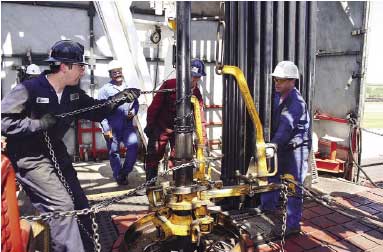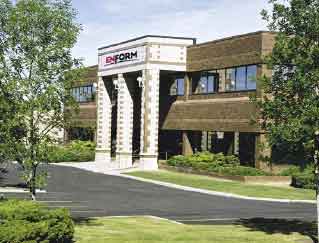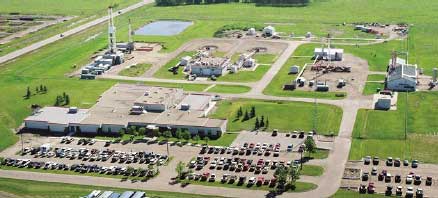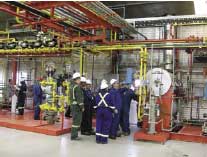Enform tackles difficult technology and safety training issues
Based in Calgary and endorsed/supported by six major trade associations, Enform provides training and certification to E&P workers throughout Canada.
INDUSTRY RECRUITMENT & RETENTIONEnform tackles difficult technology and safety training issuesBased in Calgary and endorsed/supported by six major trade associations, Enform provides training and certification to E&P workers throughout Canada.Wayne C. Wetmore, Enform, Calgary The Canadian petroleum industry is a commodity-based industry, subject to the world price for oil and the North American price for natural gas. Both are impacted by weather—not only the degree to which Canadian and US winters are cold and summers warm, but also by international occurrences, such as hurricane damage in the Gulf Coast. The resulting labor demands can fluctuate greatly with the unpredictability of commodity cycles. Our industry is made up of both conventional and non-conventional producers. Non-conventional resources, particularly oil sands developments, are long-term projects that necessitate large investments, and as such, the labor requirements are not heavily influenced by short-term economic factors. Conventional oil and gas drilling and production, however, can be quickly affected through changes to exploration budgets. DEMAND FOR SKILLED WORKERS Since the new millennium, the Canadian petroleum industry has experienced an escalating demand for skilled and unskilled labor. The focus of activity has been, and continues to be, the Western Canadian Sedimentary basin, primarily northeastern British Columbia (BC), Alberta and Saskatchewan. Canada is experiencing a labor shortage that significantly impacts our industry. The shortage is two-fold: one, a national decline in the working population; and two, a shortage in skilled occupations, such as engineers, technologists, geoscientists and certified trades, Fig. 1. Journeyman tradesmen, from welders and steam plant operators to heavy-duty mechanics and equipment operators, are in higher demand today than ever before in history.
A summary report issued in 2006, called the Alberta Regional Occupation Outlook: 2006–2011, states that employment in the province grew by 419,000 jobs in the past 10 years, and predicts steady growth at 3.5% annually. Oil and gas is one of two leading industries that accounts for 33.4% of Alberta’s gross domestic product (GDP); major investment projects in Alberta are valued at over $106 billion.1 In fact, the report shows that the primary area of job growth in Alberta will be Trades (23.1%), followed by Professional, Technical and Management (11.3%). The multi-billion-dollar oil sands projects will create near-crisis demand for skilled workers during the planning, construction and operational phases. The E&P decline of the 1980s dissuaded young people from pursuing careers as geologists and engineers, the result of which is evident today in the shortage of these skill sets and the five-to-10-year wait for new graduates. The Canadian government has streamlined the process for immigration of skilled professionals and trades people needed to support key industries, such as oil and gas, and provincial governments have implemented sponsor programs to match Canadian employers with immigrant workers. Enform works with organizations like the Catholic Immigration Society and ASPECT to facilitate the integration of new Canadians into our workforce and culture. HUMAN RESOURCE STRATEGY The Canadian petroleum industry’s strategy to address common human resources (HR) issues is to identify labor pools and provide the resources for training and safety services. The Petroleum Human Resources Council (PHRC) is the Sector Council, whose mandate is to assist the industry in addressing human resources issues. The council engages in targeted projects to showcase the industry’s positive aspects, as they are today—safer, cleaner, technologically advanced and abundant in career opportunities for both men and women. One of the most current council projects is a web portal through which officials hope to attract youth and under-represented demographics to the industry, and educate them on the myriad of career options. The council’s research shows that job seekers will select an industry before selecting an occupation, hence the strategy to increase public awareness about the industry as a whole. Once a job seeker has determined that he or she would consider a career in oil and gas, the tools and information are provided to assist this individual in selecting a suitable occupation within the industry’s wide range of sectors. A second labor initiative currently underway is the “Awareness Among Youth and Key Influencers” program. The objective is to promote the industry and its career and training opportunities to youth and key influencers, such as career counselors, through career and trade fairs and information sessions. As the petroleum industry’s training and safety services organization, Enform is a major supporter and funding source for these projects. ENFORM’S MANDATE Enform operates as a Calgary-based, non-profit organization that is owned, directed and partially funded by six industry trade associations, Fig. 2. These include the Canadian Association of Geophysical Contractors (CAGC), the Canadian Association of Oilwell Drilling Contractors (CAODC), the Canadian Association of Petroleum Producers (CAPP), the Canadian Energy Pipeline Association (CEPA), the Petroleum Services Association of Canada (PSAC), and the Small Explorers and Producers Association of Canada (SEPAC).
Enform delivers high-quality training that meets the standards established by our trade associations and the regulatory agencies in each province and territory. Training programs consist of long- and short-term courses in safety, environment, technology and career development, as well as customized and international courses. Safety training includes general safety courses, oilfield driver training, safety management courses and a selection of courses specific to the seismic industry. Environmental programs include general environmental and waste management courses and emergency response programs. Our Technology Department enhances the skills of operators and technicians through courses in petroleum engineering, gas technology, field production operations, drilling and well servicing, and petroleum fundamentals. Career development programs are comprised of management courses, instructor training and pre-employment courses, such as Drilling Rig Floor Hand and Oil and Gas Production Operator Basics. Enform also facilitates the training of remote and mobile workforces through a variety of distance delivery models, such as computer-based training (CBT) and self-study workbooks. These programs are available through Enform training centers in Calgary and Nisku, Alberta, as well as through partnerships with colleges and training agencies and a network of franchised instructors across the country. Training is delivered in the field, in the classroom and on the computer, and it is consistent among all jurisdictions; the same material is taught in Saint John’s, Newfoundland as in Fort St. John, BC. Enform consults with the provincial governments and Workers Compensation Boards to ensure that regulatory compliance and occupational health and safety are cornerstones of worker training in our industry. The organization works collaboratively on campaigns to target specific issues, such as driver safety. A field office was established in Fort St. John in 2005 to help facilitate training and safety services in support of oil and gas operations in northeastern BC. TRAINING SUCCESSES The training environment in Canada includes a myriad of programs being provided by private trainers, public training institutions, in-house trainers and Enform. In many cases, Enform’s program is the preferred training, as it meets standards developed and approved by the petroleum industry. Entry-level training has been emphasized as the key to reducing our industry’s injuries and fatalities, as more young and inexperienced workers appear on the job site. Enform’s computer-based Petroleum Safety Training (PST) program is a modular, interactive, multimedia orientation package designed to introduce workers to oil and gas. The CBT delivery method has shown to be especially effective with young workers, due in large part to their familiarity with computer usage. This method’s advantage is that it is economical and instantly available, literally at a student’s fingertips, 24/7. Classroom training is the most common delivery of Enform courses, as it is most conducive to developing problem-solving skills and allows for group discussion, Fig. 3. The biggest challenge with classroom training is simply logistics. In times when industry experiences high volumes and a fast pace of work, it can be difficult to gather students in one location at a predetermined time. Field locations are further disadvantaged by smaller student bases.
In spite of these challenges, however, completion rates from Enform courses are very high, and the competency-based approach to instruction that incorporates in-progress assessments is designed to ensure successful learning. The Canadian petroleum industry made great strides in developing its workforce skills by embracing the use of “real” industry equipment for hands-on training. In the 1980s, with the support of the Alberta government, Enform (at the time known as the Petroleum Industry Training Service) constructed the world-class Nisku Training Centre, Fig. 4. Spanning 40 acres, the Centre operates as an integrated hands-on facility, including two fully operational drilling rigs, a service rig, a well control facility with natural gas injection to simulate kicks, an oil production facility, a gas production facility, a gas utility center, rescue training devices, 17 classrooms and a skills training area.
Enform is probably best known for its signature program, H2S Alive. Hydrogen sulfide gas is a potential killer—odorless, colorless and virtually undetectable by human senses—and because most Canadian production areas have the potential to produce some degree of sour gas, it is widely accepted that field workers must have H2S Alive training. A well-trained workforce is integral to this industry’s success, and we work diligently with regulators to ensure worker competence and safety. As testament to this, Enform issued about 175,000 training certificates in 2006, representing 125 different courses, as well as exam challenges and competency assessments. Contractors are generally required to provide certification records for any personnel they will place on a work site, and the resulting volume of certifications and re-certifications places a strain on Enform’s infrastructure. The industry uses a variety of strategies to facilitate electronic communication of certification data to expedite the process, and Enform is looking at expanding this area of service. DETERMINING WORKER COMPETENCY Our industry has adopted competency assessment as another strategy to ensure a qualified workforce, and Enform currently administers two competency programs—one for service rig crew positions and the other for petroleum services occupations, Fig. 5. In the latter, trained assessors conduct formal evaluations of individual workers against pre-developed skill profiles for a designated occupation, such as well testing or snubbing supervisor. Workers who can demonstrate competency are immediately recognized with a certificate. Those not yet fully competent are redirected to training or work experience, and re-assessed at a later date.
The competency assessment approach is an excellent means by which to evaluate, and also recognize, the accomplishments of field personnel. These individuals have often amassed valuable knowledge that is not recognized by virtue of a degree or diploma; certification in a designated occupation brings greater prestige to the job and morale to the worker. This program is based on a national standard, allowing greater worker mobility within and across industries. It is recognized that sharing resources in a labor crisis is crucial to our collective success. In western Canada, the Trade Investment and Labour Mobility Agreement (TILMA)2 brings Alberta and British Columbia’s provincial standards in line with one another and recognizes training equivalency, allowing workers to seek employment in either BC or Alberta. SAFETY SERVICES Safety services are a key element of the industry’s strategy for developing an effective, efficient workforce. Within Enform, our Safety Services division supports industry safety through a variety of initiatives, including Industry Recommended Practices (IRP), the Health and Safety Certificate of Recognition (COR) Program, annual safety seminars, Safety Stand Down Week and Awards of Distinction. An IRP is a set of best practices and guidelines established by expert industry and government stakeholders. The petroleum industry has 23 IRPs in place to guide practices in, for example, Critical Sour Drilling, Safety Program Development, and Danger Tree Control. Enform acts as the certifying partner in the Certificate of Recognition (COR) program. Petroleum industry companies with health and safety programs that meet approved standards are awarded a Health and Safety Certificate of Recognition (COR). COR is a voluntary program, supported by the BC and Alberta Workers Compensation Boards with employer rebates for effectively managing worker safety and reducing worker injuries. Safety Stand Down Week is a campaign that speaks to management commitment by encouraging presidents, CEOs and senior managers, to visit their field sites and remote operations to observe and discuss safety issues with frontline workers. Enform administers the weeklong event, sharing a “toolbox” of free items, such as brochures, stickers, posters, perception surveys, CDs and an online discussion. This approach yields positive results for all levels of the company, and participation increases every year. Enform distributes safety newsletters and alerts to raise awareness of hazards and share recommendations from incident investigations. Finally, the Petroleum Industry Annual Safety Seminar (PIASS), held each year in Banff, Alberta, provides a forum for communication about industry safety. This sellout event includes Awards of Distinction, where individual contributions to safety are recognized. The line between safety services, training, and labor recruitment and retention is increasingly blurred as new strategies are explored to build a sustainable workforce. A safe work environment is essential to recruiting young workers; training is integral to safe work, and retention is enhanced by a worker’s sense of value and belonging. Enform is uniquely privileged to offer the petroleum industry a full range of these services under one roof. THE CANADIAN SOLUTION The US Department of the Interior’s Mineral Management Service (MMS) issued a recent Safety Alert on training, following several instances of non-compliance by inexperienced operators, with recommendations for training program review. Recommendations include additional training for inexperienced workers, hands-on training and the incorporation of new technology into the curriculum. Canada faces identical issues, and the petroleum industry is proactive in continually adapting and improving its training, standards and work practices. Enform believes that effective, timely training is a key tool in workforce management, as technological advances and sophisticated work processes demand skilled operators, and society demands injury-free worksites. These are indeed interesting times. History books are being rewritten. Several factors have thrust us into new territory, including Baby Boomer attrition, coupled with a declining birthrate; record volumes of resource extraction; an explosion of growth in India and China; and the threat of climate change. This is a time for leadership, and for vision. Enform is well positioned to respond to industry’s evolving needs and will commit its full resources to the challenge. Together, we will ensure the safe, highly skilled workforce for which the Canadian upstream petroleum industry is so renowned. LITERATURE CITED 1 Alberta Employment, Immigration and Industry
|
||||||||||||||||||||||||||
- Prices and governmental policies combine to stymie Canadian upstream growth (February 2024)
- U.S. producing gas wells increase despite low prices (February 2024)
- U.S. drilling: More of the same expected (February 2024)
- U.S. oil and natural gas production hits record highs (February 2024)
- U.S. upstream muddles along, with an eye toward 2024 (September 2023)
- Canada's upstream soldiers on despite governmental interference (September 2023)








